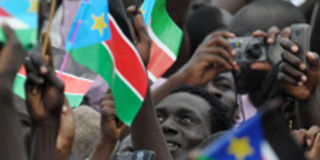World leaders salute Africa’s newest state

AFP PHOTO/ROBERTO SCHMIDT
South Sudanese celebrate their independence in the capital Juba on July 9, 2011.
US President Barack Obama led the world in formally recognising the Republic of South Sudan, giving legitimacy to that country’s declaration of independence two days ago.
Kenya, which mediated the end of Sudanese civil war between Khartoum and South Sudan People’s Liberation Movement and traditionally a strong ally of the South was among the first countries to recognise Southern Sudan.
“We welcome and fully embrace the new republic and its leadership, and look forward to working closely with her both at bilateral level as a neighbour and also within the frame work of the various regional and multilateral structures,” said President Kibaki.
South Sudan became an independent nation on Saturday, ending 50 years of exploitation and discrimination by the mainly Arab north.
The declaration of independence was made by South Sudan’s parliament speaker, splitting in two what had been Africa’s largest nation.
Mr Obama led official recognition of the country, calling it “another step forward in Africa’s long journey toward opportunity, democracy and justice.”
“I am proud to declare that the United States formally recognises the Republic of South Sudan as a sovereign and independent state upon this day, July 9, 2011,” Obama said in a statement.
UN chief Ban Ki-moon, speaking at the official ceremony in Juba, said a new chapter had been opened “when the people of South Sudan claim their freedom and dignity that is their birthright.”
Peaceful future
Messages of congratulation flooded in from nations around the world including Brazil, Canada, Egypt, Ethiopia, Jordan, Libya, Switzerland and Turkey.
“Today a new country is rising in Africa. I congratulate South Sudan on its independence and wish its people a prosperous and peaceful future,” said EU president Herman Van Rompuy in a Twitter message.
South Africa’s President Jacob Zuma said Africans from the Cape to Cairo were proud of South Sudan’s independence, after decades of conflict between the southern rebels and successive Khartoum governments that left the region in ruins and claimed millions of lives.
“We have always aspired to witness the dawn of peace, security and stability prevailing in the whole of the Sudan. That dream is coming to fruition,” said Zuma, adding however that “change always brings uncertainty and discomfort.”
Nigerian President Goodluck Jonathan, in Juba said the day marked the beginning of “a new dawn” for the people of the new country, a statement from his office said.
Nigeria would support and assist the new country in every possible way as they began the task of building a new nation, he added.
Indian Prime Minister Manmohan Singh passed on his country’s best wishes in a letter to the new country’s President Salva Kiir.
“We applaud your commitment to addressing all outstanding issues with North Sudan in an amicable and peaceful manner,” he said.
Germany’s Chancellor Angela Merkel welcomed the move as “a day of joy and great hope for the people”.
Offering help to the new nation, she said it was now important “to back South Sudan on the road to stability that will bring people peace, security and economic development.”
In France, President Nicolas Sarkozy said the independence declaration was the fulfilment of an exceptional process, initiated by a peace accord in 2005, that all the international community supported and that “the North and South (of Sudan) brought courageously to completion.”
British Prime Minister David Cameron said an ambassador to Juba had already arrived to take up his post.
“This is an historic day, for South Sudan and the whole of Africa,” he said, adding that Britain was proud to be “among the first to recognise South Sudanese independence”.
Russian President Dmitry Medvedev sent a telegram of congratulation to his South Sudanese counterpart and also expressed interest in the vast oil reserves in South Sudan.
“The Russian business world has expressed a strong interest in working with their South Sudanese partners, notably in developing and extracting its natural resources,” he said.
China’s special envoy extended President Hu Jintao’s “warmest congratulations” to the “young Republic” of South Sudan, while noting the ongoing negotiations between north and south.
He said Beijing, Sudan’s main trading partner and the largest investor in its key oil industry, hoped the two sides could be “good neighbours, partners and brothers forever.”
Israel announced its recognition of South Sudan, wishing the world’s newest nation “much success,” in a statement issued by the office of Prime Minister Benjamin Netanyahu.
“We recognise South Sudan and wish it much success as a peace-seeking country,” the statement said. “We look forward to working with it,” the statement added, suggesting Israel would seek to establish diplomatic ties with South Sudan.
Israel does not have diplomatic relations with Sudan, and has accused Khartoum of serving as a base for militants from the Palestinian Islamist group Hamas.
In April, Khartoum accused Israel of carrying out an air strike on its Red Sea coast that killed two people and destroyed the car they were travelling in.
Israel refused to comment on the incident, but its officials have expressed concern about arms smuggling through Sudan, and the attack mirrored a similar strike by foreign aircraft on a truck convoy reportedly laden with weapons in eastern Sudan in January 2009.
Much friendlier
Israel’s ties with the Sudan People’s Liberation Army, have reportedly been much friendlier.
The Jewish state was widely reported to have provided arms to the SPLA in the 22-year civil war it fought with Khartoum, although neither side publicly acknowledged weapons transfers.
The new state faces massive challenges, and IsrAID, a coalition of Israeli and Jewish NGOs, said Sunday that it was dispatching humanitarian aid to South Sudan “on behalf of the Israeli and Jewish people as a goodwill gesture between both communities.”




